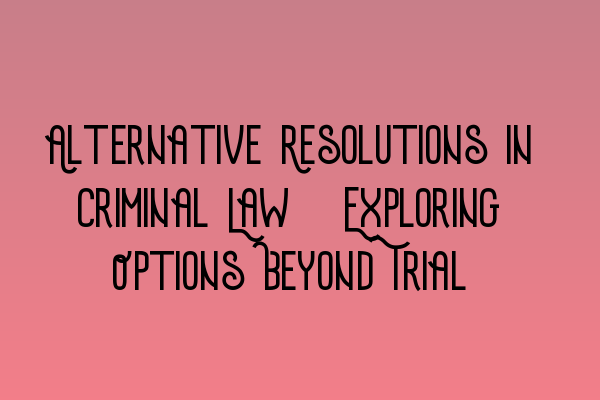Alternative Resolutions in Criminal Law: Exploring Options Beyond Trial
When it comes to criminal law, trials are often seen as the ultimate means of resolving a case. However, there are alternative options available that can achieve a fair and just outcome while avoiding the time, expense, and emotional toll of a trial. In this blog post, we will explore some of these alternative resolutions and how they can be beneficial in the practice of criminal law.
Diversion Programs
Diversion programs offer an alternative to traditional criminal prosecution for certain offenders. These programs are designed to address the underlying issues that contribute to criminal behavior and provide offenders with an opportunity for rehabilitation. By offering counseling, treatment, or community service, diversion programs aim to prevent future offenses and reduce the burden on the criminal justice system.
One example of a diversion program is a drug court, which focuses on providing treatment and support to individuals with substance abuse issues. By addressing the root cause of the criminal behavior, drug courts can help offenders break the cycle of addiction and reduce the likelihood of reoffending.
If you would like to learn more about diversion programs, you can check out our article on SQE 1 Practice Exam Questions.
Mediation and Restorative Justice
Mediation and restorative justice are alternative approaches that aim to resolve criminal cases through dialogue, understanding, and accountability. These processes involve bringing together the victim, offender, and other affected parties to discuss the harm caused and work towards a resolution.
Mediation allows the parties involved to express their feelings, concerns, and needs in a safe and controlled environment. This can lead to a greater understanding of each other’s perspectives and foster empathy. Through open communication and negotiation, mediation can result in agreements that address the needs of all parties involved.
If you want to know more about mediation and restorative justice, we have a comprehensive article on SQE 1 Practice Mocks FLK1 FLK2.
Plea Bargaining
Plea bargaining is a negotiation process that takes place between the prosecution and the defense. It involves the accused pleading guilty to a lesser charge or accepting a reduced sentence in exchange for certain concessions, such as providing cooperation or providing valuable information.
Plea bargaining can be beneficial for both the defendant and the criminal justice system. It allows individuals to avoid the uncertainties and potential harsh punishments associated with trial while ensuring that they take responsibility for their actions. Plea bargains also help reduce the backlog of cases in the courts, allowing more efficient allocation of resources.
For additional information on plea bargaining, check out our article on SQE 2 Preparation Courses.
Restitution and Compensation
Another alternative resolution in criminal law is restitution and compensation. This involves the offender compensating the victim for the harm caused. It can be in the form of monetary payments, community service, or other appropriate actions.
Restitution and compensation aim to make the victim whole again and provide a sense of justice. It also allows the offender to make amends and take responsibility for their actions. By focusing on repairing the harm caused, this alternative resolution promotes healing and reduces the need for formal court proceedings.
If you want to stay updated on the latest SRA SQE exam dates, feel free to visit our article on SRA SQE Exam Dates.
Conclusion
While trials are the most widely known method of resolving criminal cases, alternative resolutions offer valuable options that can result in fair and just outcomes. Diversion programs, mediation, plea bargaining, and restitution provide alternatives to the traditional trial process, allowing for rehabilitation, victim participation, and the efficient use of resources. As criminal law practitioners, it is important to explore these alternative options and consider their applicability to each unique case.
We hope you found this article on alternative resolutions in criminal law informative and helpful. For additional resources and preparation materials for the SQE exams, check out our comprehensive SQE 1 Preparation Courses and SQE 2 Preparation Courses.
